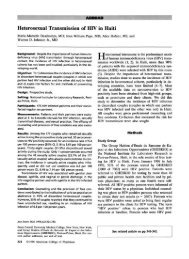- Page 1 and 2:
BEHAVIORAL SURVEILLANCE SURVEYS GUI
- Page 3 and 4:
Family Health International (FHI) H
- Page 5 and 6:
Chapter 7 Analysis and interpretati
- Page 7 and 8:
3. Choosing populations for behavio
- Page 9 and 10:
G UIDELINES FOR REPEATED BEHAVIORAL
- Page 11 and 12:
Recognizing that HIV surveillance d
- Page 13 and 14:
Different approaches to collecting
- Page 15 and 16:
The principal rationale for focusin
- Page 17 and 18:
It is not possible to validate data
- Page 19 and 20:
GUIDELINES FOR REPEATED BEHAVIORAL
- Page 21 and 22:
The process of building partnership
- Page 23 and 24:
Funders of HIV prevention activitie
- Page 25 and 26:
What is to be measured ? Indicators
- Page 27 and 28:
Step 7 : Constructing a sampling fr
- Page 29 and 30:
Step 12 : Data collection and super
- Page 31 and 32:
choosing population groups GUIDELIN
- Page 33 and 34:
the spread of HIV. For this reason,
- Page 35 and 36:
In some circumstances, public healt
- Page 37 and 38:
GUIDELINES FOR REPEATED BEHAVIORAL
- Page 39 and 40:
The majority of sub-populations of
- Page 41 and 42:
In the end, the issue boils down to
- Page 43 and 44:
In looking at behaviors of hard-to-
- Page 45 and 46:
Maps derived from program planning
- Page 47 and 48:
Selecting primary sampling units (c
- Page 49 and 50:
...when measures of size are not av
- Page 51 and 52:
If there is no reason to believe th
- Page 53 and 54:
Figure 3 : Decision tree for first-
- Page 55 and 56:
Implications of alternative samplin
- Page 57 and 58:
Table 5 : Values of Z 1-α and Z 1-
- Page 59 and 60:
Table 6 : Sample size requirements
- Page 61 and 62:
equired. In this case, the pros and
- Page 63 and 64:
Should one- or two-tailed z-score v
- Page 65 and 66:
Other measurement issues for BSS Th
- Page 67 and 68:
A “low-tech” solution to the pr
- Page 69 and 70:
5 Weighting in multi-stage sampling
- Page 71 and 72:
Figure 6 : Procedures for calculati
- Page 73 and 74:
Calculating weights from sampling p
- Page 75 and 76:
Calculating standard errors with mu
- Page 77 and 78:
6 Adapting and using questionnaires
- Page 79 and 80:
Some attempts have in the past been
- Page 81 and 82:
Informed consent Confidentiality an
- Page 83 and 84:
GUIDELINES FOR REPEATED BEHAVIORAL
- Page 85 and 86:
Recommended Methods of Statistical
- Page 87 and 88:
where n is the sample size in the d
- Page 89 and 90:
Table 2 : Reported number of non-re
- Page 91 and 92:
False conclusions: the danger of co
- Page 93 and 94:
Analysis of trends in behavior over
- Page 95 and 96:
Changes in sampling methodology ove
- Page 97 and 98:
8 Using the data collected to impro
- Page 99 and 100:
Improving prevention programs As a
- Page 101 and 102:
Finally, information about HIV and
- Page 103 and 104:
Figure 9 : HIV and STD prevalence,
- Page 105 and 106:
9 Indicators This guide identifies
- Page 107 and 108:
The standard questionnaires are acc
- Page 109 and 110:
INDICATORS Page INDICATORS FOR YOUT
- Page 111 and 112:
INDICATORS Page INDICATORS FOR MEN
- Page 113 and 114:
KEY INDICATORS What follows is a fu
- Page 115 and 116:
The indicator uses promoted data. O
- Page 117 and 118:
To be counted the numerator for thi
- Page 119 and 120:
Strengths and limitations Some meas
- Page 121 and 122:
Adult Indicator 5 Consistent condom
- Page 123 and 124:
Adult Indicator 7 (men only) Number
- Page 125 and 126:
Adult Indicator 9 Consistent condom
- Page 127 and 128:
Adult Indicator 11 Population seeki
- Page 129 and 130:
Adult Indicator 12 Exposure to inte
- Page 131 and 132:
Youth Indicator 2 No incorrect beli
- Page 133 and 134:
Youth Indicator 4 Youth sexually ac
- Page 135 and 136:
Youth Indicator 6 Number of sexual
- Page 137 and 138:
Youth Indicator 8 Consistent condom
- Page 139 and 140:
Youth Indicator 10 Commercial sex a
- Page 141 and 142:
Youth Indicator 14 Exposure to inte
- Page 143 and 144:
Female Sex Worker Indicator 2 No in
- Page 145 and 146:
Female Sex Worker Indicator 5 Sex w
- Page 147 and 148:
Indicators for men who have sex wit
- Page 149 and 150:
Men Who Have Sex With Men Indicator
- Page 151 and 152:
Men who have sex with men Indicator
- Page 153 and 154:
Men Who Have Sex With Men Indicator
- Page 155 and 156:
Men Who Have Sex With Men Indicator
- Page 157 and 158:
Indicators for injecting drug users
- Page 159 and 160:
Injecting Drug User Indicator 3 Inj
- Page 161 and 162:
Injecting Drug User Indicator 4 Inj
- Page 163 and 164:
Injecting Drug User Indicator 6 Inj
- Page 165 and 166:
Injecting Drug User Indicator 8 Dru
- Page 167 and 168:
Injecting Drug User Indicator 10 Dr
- Page 169 and 170:
Suggested Reading Brown T, Sittitra
- Page 171 and 172:
QUESTIONNAIRE For Adult Target Grou
- Page 173 and 174:
The ADULT questionnaire includes th
- Page 175 and 176:
FHI 1999 HIV/AIDS/STD BEHAVIORAL SU
- Page 177 and 178:
FHI 2000 HIV/AIDS/STD BEHAVIORAL SU
- Page 179 and 180:
FHI 2000 HIV/AIDS/STD BEHAVIORAL SU
- Page 181 and 182:
FHI 2000 HIV/AIDS/STD BEHAVIORAL SU
- Page 183 and 184:
FHI 2000 HIV/AIDS/STD BEHAVIORAL SU
- Page 185 and 186:
FHI 2000 HIV/AIDS/STD BEHAVIORAL SU
- Page 187 and 188:
FHI 2000 HIV/AIDS/STD BEHAVIORAL SU
- Page 189 and 190:
FHI 2000 HIV/AIDS/STD BEHAVIORAL SU
- Page 191 and 192:
POSSIBLE ADDITIONAL QUESTIONS Commu
- Page 193 and 194:
STD Treatment seeking behaviors No.
- Page 195 and 196:
STD Treatment seeking behaviors (co
- Page 197 and 198:
QUESTIONNAIRE For Unmarried Male An
- Page 199 and 200:
The YOUTH questionnaire includes th
- Page 201 and 202:
FHI 2000 HIV/AIDS/STD BEHAVIORAL SU
- Page 203 and 204:
FHI 2000 HIV/AIDS/STD BEHAVIORAL SU
- Page 205 and 206:
FHI 2000 HIV/AIDS/STD BEHAVIORAL SU
- Page 207 and 208:
FHI 2000 HIV/AIDS/STD BEHAVIORAL SU
- Page 209 and 210:
FHI 2000 HIV/AIDS/STD BEHAVIORAL SU
- Page 211 and 212:
FHI 2000 HIV/AIDS/STD BEHAVIORAL SU
- Page 213 and 214:
POSSIBLE ADDITIONAL QUESTIONS Commu
- Page 215 and 216:
No. Questions and filters Coding ca
- Page 217 and 218:
Stigma and Discrimination No. Quest
- Page 219 and 220:
FAMILY HEALTH INTERNATIONAL (FHI) H
- Page 221 and 222:
FHI 2000 HIV/AIDS/STD BEHAVIORAL SU
- Page 223 and 224:
FHI 2000 HIV/AIDS/STD BEHAVIORAL SU
- Page 225 and 226:
FHI 2000 HIV/AIDS/STD BEHAVIORAL SU
- Page 227 and 228:
FHI 2000 HIV/AIDS/STD BEHAVIORAL SU
- Page 229 and 230:
FHI 2000 HIV/AIDS/STD BEHAVIORAL SU
- Page 231 and 232:
FHI 2000 HIV/AIDS/STD BEHAVIORAL SU
- Page 233 and 234:
POSSIBLE ADDITIONAL QUESTIONS Commu
- Page 235 and 236:
STD Treatment seeking behaviors No.
- Page 237 and 238:
STD Treatment seeking behaviors (co
- Page 239 and 240:
QUESTIONNAIRE For Men Who Have Sex
- Page 241 and 242:
The MSM questionnaire includes the
- Page 243 and 244: FHI 2000 HIV/AIDS/STD BEHAVIORAL SU
- Page 245 and 246: FHI 2000 HIV/AIDS/STD BEHAVIORAL SU
- Page 247 and 248: FHI 2000 HIV/AIDS/STD BEHAVIORAL SU
- Page 249 and 250: FHI 2000 HIV/AIDS/STD BEHAVIORAL SU
- Page 251 and 252: FHI 2000 HIV/AIDS/STD BEHAVIORAL SU
- Page 253 and 254: FHI 2000 HIV/AIDS/STD BEHAVIORAL SU
- Page 255 and 256: FHI 2000 HIV/AIDS/STD BEHAVIORAL SU
- Page 257 and 258: FHI 2000 HIV/AIDS/STD BEHAVIORAL SU
- Page 259 and 260: STD Treatment seeking behaviours No
- Page 261 and 262: No. Questions and filters Coding ca
- Page 263 and 264: QUESTIONNAIRE For Injecting Drug Us
- Page 265 and 266: This questionnaire includes the fol
- Page 267 and 268: FHI 2000 HIV/AIDS/STD BEHAVIORAL SU
- Page 269 and 270: FHI 2000 HIV/AIDS/STD BEHAVIORAL SU
- Page 271 and 272: FHI 2000 HIV/AIDS/STD BEHAVIORAL SU
- Page 273 and 274: FHI 2000 HIV/AIDS/STD BEHAVIORAL SU
- Page 275 and 276: FHI 2000 HIV/AIDS/STD BEHAVIORAL SU
- Page 277 and 278: FHI 2000 HIV/AIDS/STD BEHAVIORAL SU
- Page 279 and 280: FHI 2000 HIV/AIDS/STD BEHAVIORAL SU
- Page 281 and 282: FHI 2000 HIV/AIDS/STD BEHAVIORAL SU
- Page 283 and 284: FHI 2000 HIV/AIDS/STD BEHAVIORAL SU
- Page 285 and 286: FHI 2000 HIV/AIDS/STD BEHAVIORAL SU
- Page 287 and 288: FHI 2000 HIV/AIDS/STD BEHAVIORAL SU
- Page 289 and 290: EXAMPLE OF SUPERVISORS’ AND INTER
- Page 291 and 292: A “take-all” approach is to be
- Page 293: • To probe for additional informa
- Page 297 and 298: An example of a question for which
- Page 299 and 300: Part C: Section-by-section review o
- Page 301 and 302: Q109. If the respondent says he/she
- Page 303 and 304: it is asking if the respondent has
- Page 305 and 306: Section 5 : Non-regular partners Q5
- Page 307 and 308: Q706 : This question determines the
- Page 309 and 310: Q910 - Q912 : Knowledge of maternal
- Page 311 and 312: in riskier behavior (i.e., not usin
- Page 313 and 314: Section 5 : Non-paying partners Que
- Page 315 and 316: 3 APPENDIX WORKING EXAMPLES OF SAMP
- Page 317 and 318: For the purposes of the BSS, the ke
- Page 319 and 320: The second stage sampling procedure
- Page 321 and 322: Notes: 1. It may not always be poss
- Page 323 and 324: The information from the mapping ex
- Page 325 and 326: In Figure 3, clusters were chosen b
- Page 327 and 328: Fieldwork assignments when the “t
- Page 329 and 330: Figure 4 : Example of targeted snow
- Page 331 and 332: In some settings it may not be acce
- Page 333 and 334: Figure 6 : Steps in using the segme
- Page 335 and 336: Figure 9 : Map of hypothetical samp
- Page 337 and 338: In-class sampling of school youth T
- Page 339 and 340: Alternative to “in-class” sampl
- Page 341 and 342: found at the various locations at d
- Page 343 and 344: What should be done if, even after
- Page 345 and 346:
FIELDWORK FORMS The following set o
- Page 347 and 348:
Form I Cluster Selection Sheet (Pro
- Page 349 and 350:
Form 2 Cluster Selection Sheet (Equ
- Page 351 and 352:
Form 3 Assignment Information Sheet
- Page 353 and 354:
Form 4 Cluster Information Sheet Su
- Page 355 and 356:
TABLE OF CHI-SQUARE STATISTICS AND
- Page 357 and 358:
Step 2 : Calculate the expected num










